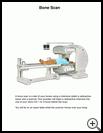
Bone Scan
________________________________________________________________________
KEY POINTS
- A bone scan is a test of your child’s bones using a chemical injected into a vein called a radioactive tracer and a scanner.
- The bone scan can help find problems with your child’s bones such as tumors, infection, some types of arthritis, and bone fractures. It can often find problems long before they would show up on a regular X-ray.
- Ask your child’s healthcare provider how and when you will hear your child’s test results.
________________________________________________________________________
What is a bone scan?
A bone scan is a test of your child’s bones using a chemical injected into a vein called a radioactive tracer and a scanner.
When is it used?
The bone scan can help find problems with your child’s bones such as tumors, infection, some types of arthritis, and bone fractures. It can often find problems long before they would show up on a regular X-ray.
How do I prepare my child for this scan?
- Your child may or may not need to take regular medicines the day of the procedure. Tell the healthcare provider about all medicines and supplements your child takes. Some products may increase the risk of side effects. Ask the healthcare provider if your child needs to avoid taking any medicine or supplements before the procedure.
- Tell the healthcare provider if your child has any food, medicine, or other allergies such as latex.
- Tell your child’s provider if your child has had kidney problems or an allergy to injected chemicals.
- Tell your child’s healthcare provider if your child has recently had X-ray tests using barium or has taken medicine that contains bismuth such as Pepto-Bismol. Barium and bismuth can interfere with the test results.
- Tell your child’s healthcare provider if your older child is or may be pregnant or is breastfeeding.
- Follow any other instructions your child’s healthcare provider gives you.
- Ask any questions you have before the test. You should understand what your child’s healthcare provider is going to do. You have the right to make decisions about your child’s care and to give permission for any tests or procedures.
Your child’s provider will inject a radioactive chemical into one of your child’s veins (IV) 1 to 3 hours before the scan. After the injection, your child will drink several glasses of water to get rid of any chemical that has not been picked up by your child’s bones. Your child will be asked to go to the bathroom and urinate just before the scan so that the bladder will be empty.
What happens during the scan?
To start the scan, your child will lie on an exam table while the scanner moves over the body. Your child may be asked to get into different positions on the scanner table to get a better scan of certain bones. Your child needs to keep still while being scanned. Your child may be given medicine to help relax during the test. Images are shown on a computer after the scan.
The scanning generally lasts 30 to 60 minutes and does not hurt.
What happens after the scan?
The bone scan results will be reviewed by a radiologist and reported to your child’s healthcare provider. Ask your child’s healthcare provider how and when your child’s test results. Do not assume the results are normal if you do not hear from your child’s health care provider or the place that did your child’s bone scan. Radiologists are doctors who have special training in reading X-ray films and other types of images.
Your child can go home after the scan is done. Your child’s body will get rid of the radioactive chemical through urine within 36 hours. There will be no change in the color of the urine. The amount of radiation injected is small and your child will not be a danger to your family.
Ask your child’s healthcare provider what symptoms or problems you should watch for and what to do if your child has them.
Make sure you know when you should come back for another scan or checkup. Keep all appointments for provider visits or tests.
What are the risks of this scan?
Every procedure or treatment has risks. Your child could have an allergic reaction to the injected chemical. The amount of radioactive material given for this scan is very small and is not a health risk.
Ask your child’s healthcare provider how the risks apply to your child. Be sure to discuss any other questions or concerns that you may have.
Last modified: 2021-12-07
Last reviewed: 2020-11-16

